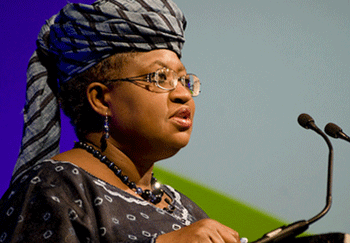 The Federal Government’s revised medium term revenue and expenditure strategy before the National Assembly does not appear to have any hope for the ordinary Nigerian. Rather it is a routine of the usual. Emphasis in the document is still very much on high recurrent expenditure. Little is left for investment in projects that can grow the economy and create jobs. A nation that is being ravaged by poverty needs a creative budgeting that will encourage massive investment by both the public and private sectors of the economy.
The Federal Government’s revised medium term revenue and expenditure strategy before the National Assembly does not appear to have any hope for the ordinary Nigerian. Rather it is a routine of the usual. Emphasis in the document is still very much on high recurrent expenditure. Little is left for investment in projects that can grow the economy and create jobs. A nation that is being ravaged by poverty needs a creative budgeting that will encourage massive investment by both the public and private sectors of the economy.
This is the known way out of a poverty trap.
The medium term financial strategy envisaged that total expenditure for 2012 will be N4.648 trillion out of which capital expenditure will take N1.284 trillion while non debt recurrent will take N2.432 trillion. Total recurrent remained high at N3.716 trillion. This is the amount the Federal Government will spend on itself, employees and pay interest on loans it took from banks and other lenders.
Personnel cost alone stands at N1.658 trillion with overhead cost taking as much as N242.85 billion. Funny enough, with all the uproar that greeted the cost of governance early in the year, government has only been able to cut overhead cost provisions by about N46 billion from the N288.05 of 2011. Going by the provisions of the revised medium term financial strategy document before the National Assembly, in 2013, the government’s total expenditure outlay stands at N4.828 trillion; recurrent as usual takes the larger chunk of N3.879 trillion with N2.494 trillion as non debt recurrent spending.
Of this, N1.680trillion goes into personnel cost for payment of salaries, wages and allowances of federal civil servants while N242.85 billion is provided for overhead cost. Capital budget in 2013 is N1.384 trillion.
This is the amount that will be spent on long term projects such as road construction, rehabilitation etc. It is this component of the budget that can grow the economy. It is small compared to the amount earn mark for recurrent. As it is in the past not all of this capital provisions will be utilized. As experience has shown over the years at best 60 per cent will be implemented. This will mean that there is little scope in the 2012-2014 provisions for growth not to talk of development. In 2014, a year before the next general election in the country, N4.925 trillion is provided for as the total budget expenditure. Recurrent will take N4.06 trillion, non debt N2.521 trillion, Capital spending N1.546 trillion.
Looking at these provisions, it is going to be tough for the ordinary Nigerian. Many who are at the moment above the poverty line are likely to drop into poverty between 2012 and 2014. As at last count, over 112 million Nigerians out of a population of 160 million are said to be under the poverty line of living on about N200 a day. The import of these statistics is to bring to the fore the fact that a significant portion of Nigeria’s populace is poor and government spending pattern is not being directed to address poverty.
The question then is, what do we do with this data? How do we achieve the Millennium Development Goals of 2015 given this statistical reality and expenditure pattern? It shows that there is a lot of work for the government to do to uplift a huge portion of the populace out of poverty. But with this kind of budgeting, the government is not setting the pace for job creation and human empowerment. If government continues to spend 70 per cent of the nation’s earning on less than 1 per cent of the population, it has less than nothing left for development that would lift the country out of poverty trap.
Given the burgeoning number of people classified as “poor”, as revealed by the statistics from NBS, one had thought that the relevant government agencies responsible for planning for economic development will roll up their sleeves and treat economic empowerment with a higher sense of urgency and tact. What is the President doing with a cloud of ministers, political appointees, and other hangers on in the corridor of power that continues to drain the nation’s purse? What about the National Assembly, why not trim their budget further to release funds for development?
The major area of concern for all patriots is that the Nigerian government is spending too much on overhead instead of on capital. This policy, which encourages borrowing to finance overhead, leads to inflation and a heavy debt burden in the next ten to twenty years. Nigeria has moved from a deficit of N54.49 billion in 2008 to a deficit of N80.36 billion in 2009 and N1.79 trillion 2010. The Overhead of the National Assembly was 21 per cent in 2008, 26 per cent in 2009 and 25 per cent in 2010. As overhead increases, the executive spending puts pressure on inflation. As a country, Nigerian cannot keep spending and spending on overhead and recurrent. It is not good for Nigeria, more capital spending is needed.
To make matters worse for Nigerians the entire budget process is based on the wish that oil prices remain high to generate the projected income streams. But all of us know that if wishes were horses, beggars would ride. I just wonder how many Nigerians this kind of budgeting will turn into beggars by 2015.

